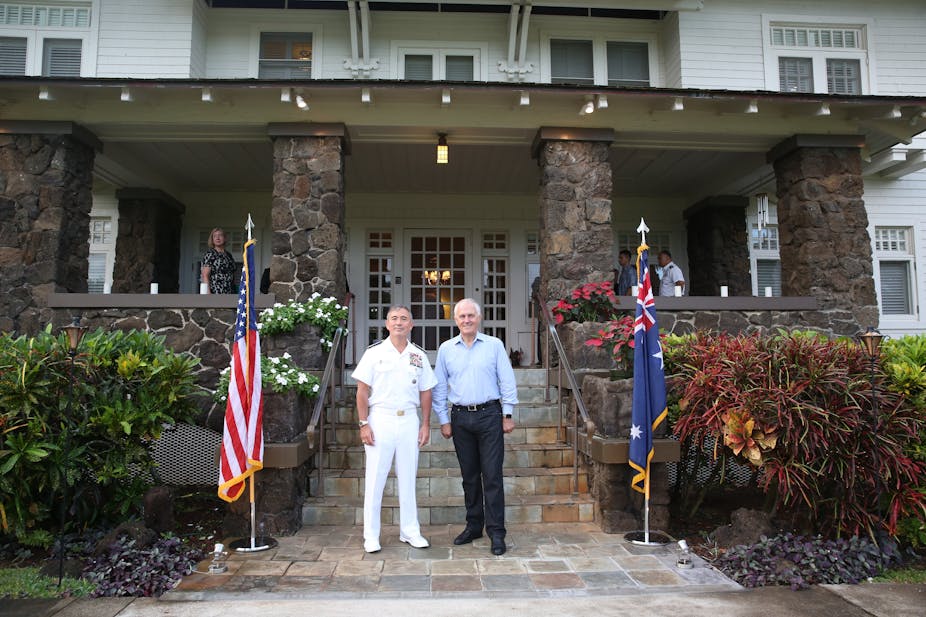Malcolm Turnbull’s first visit as prime minister to the United States this week was neat, well-packaged and very successful.
Turnbull spent just one night in Washington – but that was at Blair House, the official guest residence, an invitation that is seen as marking top treatment. He looked comfortable with Barack Obama in the Oval Office, and they were in accord on the checklist of items discussed. It was apparently an easier rapport than last year when they met during the summit season.
Turnbull had dropped in to Iraq and Afghanistan on his way, which provided not just a chance to visit Australian troops but meant he had a very current read-out to give Obama.
There have been different interpretations of whether Turnbull presented to the Americans a more “independent” face of Australian policy.
It seems more a matter of tone and language than substance.
Tony Abbott’s approach to the Americans and the alliance had a strong tribal element; Turnbull talks values and emphasises America’s role in underpinning and promoting a rules-based international order. But their landing point in geopolitical terms is similar, making for considerable continuity in Australia’s approach. It is a continuity imposed by strategic fundamentals.
It’s true that before the visit the Turnbull government had responded negatively to the US request for more military help in the conflict with Islamic State - a request made in what Turnbull described as a “form” letter to some 40 countries.
It’s assumed Abbott would probably have scrambled to say yes. But the Turnbull government’s response has to be put in the context that this was not a specific request and Australia already is the second-largest contributor.
After the glow of a trip in which nothing went wrong, Turnbull has returned home to a fractious and somewhat uncertain scene on his side of politics.
In Turnbull’s own state of NSW, the opening of Liberal preselections has spurred bitter power plays. A combination of factionalism, pressure for generational renewal, and boundary changes in the recent redistribution makes for red-hot tensions.
The party’s conservatives, angry ants in the post-Abbott era, see the moderates and their allies (some of whom are themselves from the fractured right) trying to expand their seats in the general shake-up. Veteran MPs Philip Ruddock, Bronwyn Bishop and senator Bill Heffernan are under pressure to make way for younger people. There is especially strong feeling against Bishop because of the damage she caused the government last year. New electoral boundaries are turning Liberal against Liberal.
A certain amount of preselection angst inevitably precedes every election. Turnbull himself mounted a ferocious and successful campaign to replace a first-term MP. Unless something extraordinarily silly occurred, such as up-and-comer Angus Taylor being denied preselection in his seat of Hume – which one can be pretty confident won’t happen – most of the turbulence will eventually subside after the battles are resolved.
Turnbull formally stands by all his current parliamentarians, although in practice his attitudes towards the fate of individuals obviously varies. His best course is to exert whatever leverage he needs to through Liberal federal director Tony Nutt and personally to stay as much as possible in the background.
Abbott’s preselection is not at risk; the question is whether he seeks its renewal. He is said to be still weighing his options. His alternatives for another career are limited, and what he has said so far suggests he is inclined to go to another term. If he does, this will reinforce the distractions in the parliamentary Liberal Party.
Probably more important, though, is what happens in the Nationals. If, as speculated, party leader and Deputy Prime Minister Warren Truss soon steps down from the leadership and is replaced by the volatile Barnaby Joyce, the dynamics at the top of the government will be changed. It’s a prospect that makes many Liberals nervous. Turnbull is waiting on Truss signalling his future before he undertakes the reshuffle that’s needed after Jamie Briggs’ resignation and the standing aside (but not resignation) of Mal Brough.
Despite some media chatter, there seems minimal prospect of a pre-budget election. Turnbull and his ministers are repeatedly talking about the government going full term (Treasurer Scott Morrison was categoric on Thursday). These comments would be politically unwise if Turnbull had any idea of rushing off to the polls. That would make him look untrustworthy, a bad start to a campaign.
Anyway, there is a great deal of work to be done before the election – the tax package is still a good way off.
Not that the opposition leader is waiting to see that package. Bill Shorten has been campaigning as though changes to the GST are already government policy. Shorten’s problem, however, is that it is very hard to get traction for a scare campaign unless and until there is an actual policy to justify it.
In our poll-driven political world, politicians on both sides will be waiting for the first major polls of the year. Anecdotally, Shorten continues to be in an extremely poor position. Turnbull has in his political possession lethal material from the trade union royal commission report released just after Christmas – the opposition’s attempts to discredit the commission are overwhelmed by the damning evidence. Labor still refuses to take a sufficiently tough approach to bad union behaviour and rogue unions, particularly the Construction, Forestry, Mining and Energy Union.
The ALP wishes desperately it could turn the clock back a year when its prospects appeared so bright against the hapless Abbott.
Would Labor be better placed if it had chosen Anthony Albanese as leader? In retrospect, probably. But it’s unlikely he would be competitive against Turnbull either.

